Table of Contents
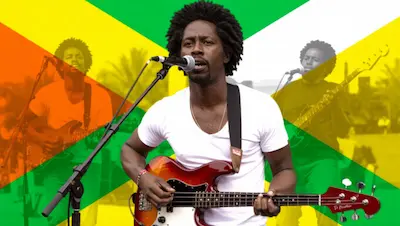
Introduction: More Than Music
Maybe it was that offbeat groove that makes you sway. Maybe it was Bob Marley’s voice telling you everything was “gonna be alright”. Or maybe it was something deeper — that feeling that this music says something to you, heals you, or calls you to stand for something.
This article explores reggae’s journey across borders, from its humble beginnings in Kingston’s Trenchtown to global festivals, social movements, and spiritual awakenings. We’ll trace how reggae inspired new genres, empowered the voiceless, and built bridges between cultures.
Whether you’re a lifelong fan or just beginning to tune in, this is the story of how reggae became a worldwide force — and why it still matters today.Maybe it was that offbeat groove that makes you sway. Maybe it was Bob Marley’s voice telling you everything was “gonna be alright”. Or maybe it was something deeper — that feeling that this music says something to you, heals you, or calls you to stand for something.
This article explores reggae’s journey across borders, from its humble beginnings in Kingston’s Trenchtown to global festivals, social movements, and spiritual awakenings. We’ll trace how reggae inspired new genres, empowered the voiceless, and built bridges between cultures.
Whether you’re a lifelong fan or just beginning to tune in, this is the story of how reggae became a worldwide force — and why it still matters today.
What Is Reggae Music?
Reggae is more than just music — it’s a cultural movement, a philosophy, a global language of resistance, unity, and love that has been changing the world since the late 1960s.
Reggae emerged as the successor to ska and rocksteady, marked by its signature offbeat rhythm, deep basslines, and socially conscious lyrics.
Unlike other popular music styles, reggae carries with it a spiritual message, deeply tied to Rastafari beliefs, Pan-African identity, and postcolonial struggle.
At its core, reggae is defined by:
- Syncopated rhythm: The skank — a sharp, staccato guitar or piano chop — falls on the offbeat, giving reggae its laid-back, hypnotic groove.
- Prominent basslines: In reggae, the bass carries the melody and emotion, often described as the “heartbeat” of the music.
- Conscious lyrics: Reggae music often addresses themes like oppression, poverty, resistance, and spiritual liberation, standing in stark contrast to the commercial themes of many Western genres.
The genre’s instrumentation typically includes:
- Drums (especially the “one-drop” rhythm)
- Bass guitar
- Rhythm and lead guitars
- Keyboards or organ
- Horn sections in many classic tracks
Over the decades, reggae has expanded into subgenres such as roots reggae, dub, lovers rock, dancehall, and reggae fusion — each contributing to the genre’s richness and global reach.
For a complete guide to the evolution of reggae, read our pillar post.
Why People Love Reggae Music
The appeal of reggae lies not only in its sound but also in its message and mood. It is music to relax to, to reflect on, and to rise up with. Many fans are drawn to reggae because it:
- Evokes a sense of peace, unity, and calm
- Speaks out against injustice and corruption
- Offers spiritual depth through its connection with Rastafari
According to many reggae fans, the genre “vibrates higher” — connecting the listener to something deeper than entertainment: purpose.
The Origins: Reggae’s Jamaican Roots
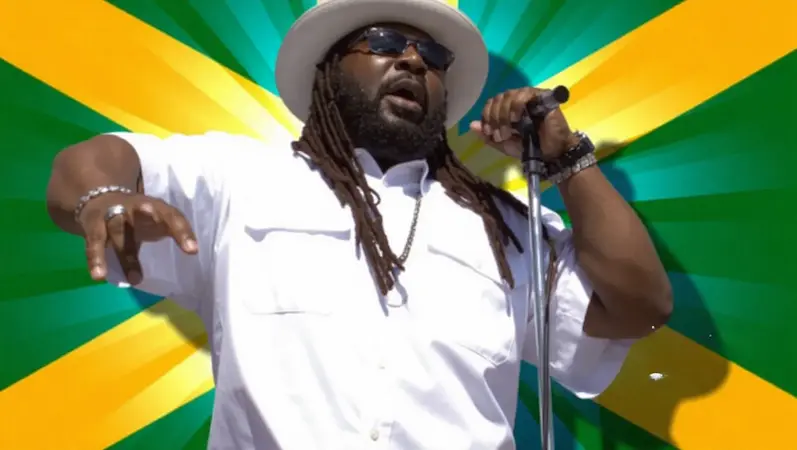
Reggae didn’t just emerge from a recording studio — it was born in the streets of Kingston, carved into the soul of a young, independent Jamaica. You could feel it rising from dusty alleyways and bouncing off zinc-roofed shacks, blasting from handmade sound systems and echoing through late-night dancehalls. It was raw, real, and rooted in the struggles — and hopes — of the people.
Before reggae had a name, it had a heartbeat. That rhythm pulsed through mento, moved faster in ska, and settled into a smooth sway with rocksteady. But in the late 1960s, something new took hold — a deeper sound that reflected the turmoil and transformation of Jamaican society. That sound was reggae.
When Toots Hibbert belted out “Do the Reggay”, he didn’t just launch a song — he named a movement. And that movement quickly became the soundtrack to a rising consciousness.
Jamaica’s Soul in Song
Reggae is inseparable from Jamaica’s complex story — its colonial past, its hard-won independence in 1962, and the poverty and power struggles that followed. In the overcrowded neighborhoods of Kingston, young men with guitars and notebooks became philosophers and prophets, channeling everything they saw and felt into lyrics and beats.
Reggae wasn’t polished. It wasn’t pretentious. It was a mirror — and a megaphone.
And behind much of its vision was the Rastafari movement, which gave reggae its spiritual backbone and revolutionary mindset. Rastafari turned Babylon into a metaphor for oppression, and Zion into a symbol of hope. The music became a vessel for that message — accessible, danceable, but deeply powerful.
The Sound System Revolution
In Jamaica, if you had a few speakers, a generator, and a deep box of records, you could turn a quiet street into a full-blown block party. That was the magic of the sound systems — local crews who battled each other with bass, dubs, and exclusive tracks.
These weren’t just parties — they were launchpads. Artists who got played on the right system could go from unknown to underground legend overnight. Studio pioneers like King Tubby and Lee “Scratch” Perry turned mixing into a form of storytelling, experimenting with echo, delay, and the heavy drop of the bassline.
Voices That Changed Everything
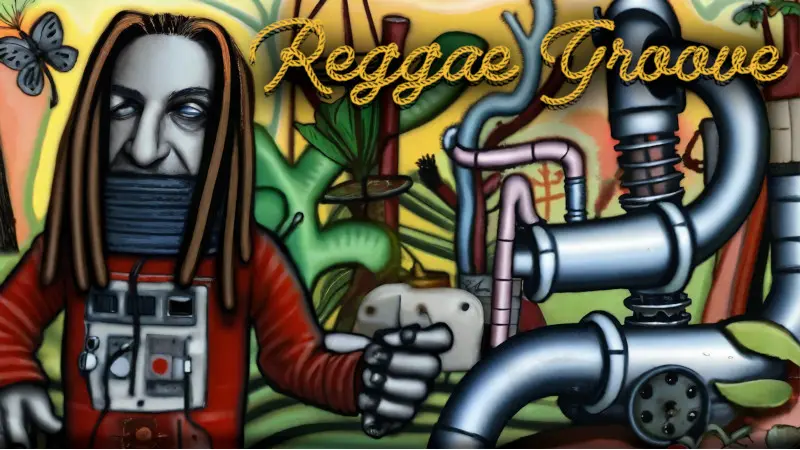
You can’t talk about reggae’s beginnings without naming the voices that carried it across oceans.
- Bob Marley: The lion of Zion, whose every verse sounded like scripture
- Peter Tosh: Fierce, political, and fearless
- Jimmy Cliff: The storyteller, whose film The Harder They Come brought reggae to movie screens worldwide
- Burning Spear and Gregory Isaacs: Soulful and spiritual, grounding reggae in both history and heart
These artists didn’t just play music — they gave people a reason to believe.
From Trenchtown to the World
Even today, reggae musicians from Europe, Africa, and Asia still make pilgrimages to Kingston, drawn to the heartbeat of where it all began. The influence of those early years — the dirt under your feet, the vinyl crackle, the righteous fire — still shapes the global reggae identity.
To know reggae is to know Jamaica — its beauty, its resilience, and its refusal to be silenced.
Cultural Impact and Activism
Reggae was never meant to sit quietly in the background. From the moment it hit the airwaves, it demanded to be heard — not just for its hypnotic rhythm, but for its unapologetic message. This was music with a mission. It didn’t just entertain; it enlightened.
Reggae as the Voice of the People
In the 1970s, while disco glittered and rock rolled, reggae stood in the trenches. It became the soundtrack of struggle — a voice for the poor, the oppressed, and the unheard. When Bob Marley sang “Get Up, Stand Up”, it wasn’t a metaphor. It was a call to resist injustice, to fight Babylon, and to reclaim identity in a world that tried to erase it.
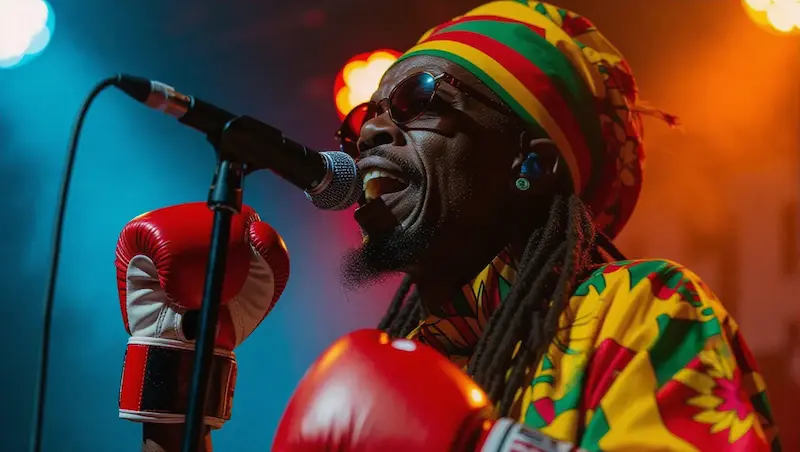
Marley once said, “One good thing about music, when it hits you, you feel no pain.” But reggae didn’t pull punches. It hit hard — and it healed, too.
From the ghettos of Kingston to the townships of South Africa, reggae gave people a way to speak truth without fear. In apartheid-era Cape Town, Marley’s music was banned from the radio, yet it still echoed from underground parties and bootleg tapes, fuelling hope.
The Influence of Rastafari
At the heart of reggae’s cultural power is Rastafari, a spiritual philosophy that sees Emperor Haile Selassie I of Ethiopia as a divine figure and calls for the repatriation of African descendants to their roots.
But Rasta is more than religion — it’s a way of life. It promotes:
- Livity – living in harmony with nature and others
- Ital food – clean, plant-based nourishment
- Natural living – rejecting the excess and ego of Babylon
- Unity and oneness with all humanity
Reggae became Rastafari’s mouthpiece — its vessel. Through lyrics laced with Biblical references, African history, and spiritual metaphors, artists spread a message of awakening to the world.
A Global Movement for Justice
It’s no coincidence that reggae found a home in every corner of the world where people were fighting for something.
In the 1980s:
- Activists in Zimbabwe blasted Marley’s “Zimbabwe” during their independence celebration — with Marley himself performing live in Harare.
- In the UK, reggae became the soundtrack of resistance for Caribbean immigrants facing racism and police violence.
- In the U.S., reggae was embraced by civil rights activists and later by hip-hop pioneers who recognized its revolutionary roots.
Even today, reggae fuels movements for climate justice, cannabis legalization, and indigenous rights — its messages just as relevant now as they were 50 years ago.
Lyrics with a Message
Reggae’s true power lies in its words. Whether it’s Marley singing “Emancipate yourselves from mental slavery”, or Peter Tosh shouting “Equal Rights and Justice”, the genre reminds us that music can be more than entertainment — it can be a weapon, a medicine, a prayer.
Every line is a lesson. Every chorus is a chant. And every performance is a sermon.
The Global Spread of Reggae Music
Reggae was born on a small island — but it didn’t stay there for long. Like smoke rising from a spliff, its rhythm drifted across oceans and borders, settling into corners of the world that had never heard anything like it before. What started in Kingston’s Trenchtown soon echoed through London’s council flats, Tokyo’s dancehalls, Lagos’ sound systems, and California’s beaches.
Wherever it landed, reggae adapted — and in doing so, it connected people across cultures, languages, and generations.
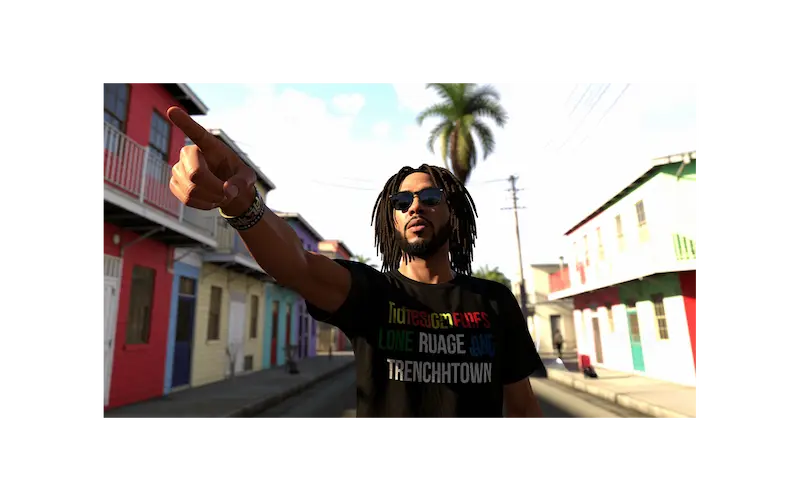
United Kingdom: Second Home of Reggae
If Jamaica was the cradle of reggae, the UK became its amplifier. In the 1970s and ‘80s, thousands of Jamaican immigrants brought their music, customs, and spirituality to Britain’s shores.
In the working-class neighborhoods of London, Birmingham, and Bristol, reggae became the voice of a new generation — a generation caught between Caribbean roots and British identity, between belonging and exclusion.
From this fertile ground came legendary acts:
- Steel Pulse – fierce and politically charged
- UB40 – bringing reggae to the pop charts
- Aswad and Matumbi – blending roots reggae with soul and dub
In Britain, reggae collided with punk, giving birth to new sounds like two-tone ska and inspiring bands like The Clash. It wasn’t just a genre anymore — it was a social movement in stereo.
Japan: A Surprising Reggae Superfan
One of the most unexpected — and passionate — reggae communities exists in Japan. Since the 1980s, Japanese fans have embraced reggae with astonishing devotion. The country now boasts:
- Massive reggae festivals like Yokohama Reggae Sai
- A thriving dancehall scene with local selectors and MCs
- Japanese reggae artists like Rankin Taxi, Pushim, and Mighty Crown (a world champion sound system crew)
What draws Japan to reggae? Perhaps it’s the focus on discipline, identity, and respect. Or maybe it’s the universal power of bass and truth. Either way, reggae in Japan is not a niche — it’s a movement with deep roots.
Africa: Reggae Comes Full Circle
When reggae touched down in Africa, it was more like a homecoming. The genre’s messages — Pan-Africanism, liberation, spirituality — resonated deeply with African audiences who had lived through colonization, apartheid, and political struggle.
In countries like:
- Nigeria, artists like Majek Fashek became icons of reggae consciousness
- South Africa, reggae was used to resist apartheid and unite Black voices
- Ghana, Ivory Coast, and Senegal, reggae fused with local languages and rhythms
Today, African reggae remains vibrant, often blending with genres like Afrobeats, highlife, and dancehall, continuing the musical conversation between continents.
France, Germany & Italy: Europe’s Reggae Capitals
Western Europe fell in love with reggae — and never let go. From the roots revival in Paris to massive reggae festivals in Germany, Europe has become one of reggae’s strongest global markets.
Highlights:
- Reggae Sun Ska (France) and Summerjam (Germany) draw thousands yearly
- Artists like Alborosie (Italy) and Gentleman (Germany) have global followings
- Many European bands record in Jamaica to stay true to the roots
What’s striking is how reggae in Europe often remains deeply committed to conscious lyrics, Rastafarian philosophy, and roots sound — even as it evolves with new production styles.
United States: Reggae’s West Coast Vibes
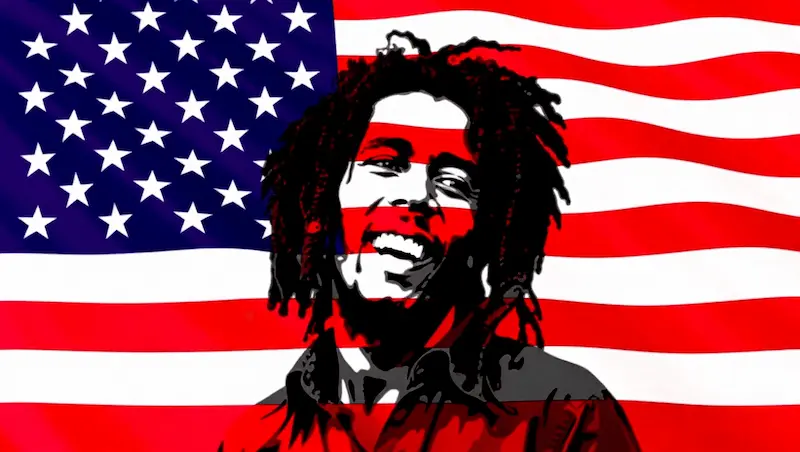
In the U.S., reggae flourished most prominently on the West Coast, where surf, sunshine, and spiritual rebellion made fertile ground for its easygoing groove.
From the 1980s onward:
- Bands like Sublime, 311, and Slightly Stoopid blended reggae with punk and hip-hop
- California Roots Festival became a mecca for reggae-rock fusion
- American reggae bands like SOJA, Rebelution, and The Green gained huge followings, especially among college crowds and conscious communities
Though not always purist, U.S. reggae culture celebrates the genre’s values of unity, freedom, and positivity — often with a modern twist.
New Zealand & the Pacific: Deep Spiritual Connection
In places like New Zealand, Hawaii, and Polynesia, reggae took hold in a unique way. It wasn’t just music — it became part of indigenous identity, decolonization, and cultural pride.
Artists like:
- Katchafire, House of Shem, and The Black Seeds from NZ
- J Boog (Samoan-American) and Fiji from the Pacific Islands
…have fused reggae with traditional chants, native languages, and island rhythms, proving that reggae’s message of roots and resilience transcends geography.
Reggae in Every Corner
Today, you’ll find reggae:
- Pumping from taxis in Nairobi
- Sung in Swedish by grassroots bands
- Mixed with bhangra beats in India
- Or freestyled over hip-hop tracks in Brooklyn
It’s a language of rhythm and resistance — and it speaks fluently across borders.
Top Reggae Artists Who Shaped the Genre
Behind every movement are the voices that carry it. And in reggae, those voices do more than sing — they preach, provoke, uplift, and unite. These are the reggae artists who didn’t just make music; they made history. Their rhythms became rallying cries. Their lyrics became mantras. Their lives became messages.
Bob Marley: The Prophet
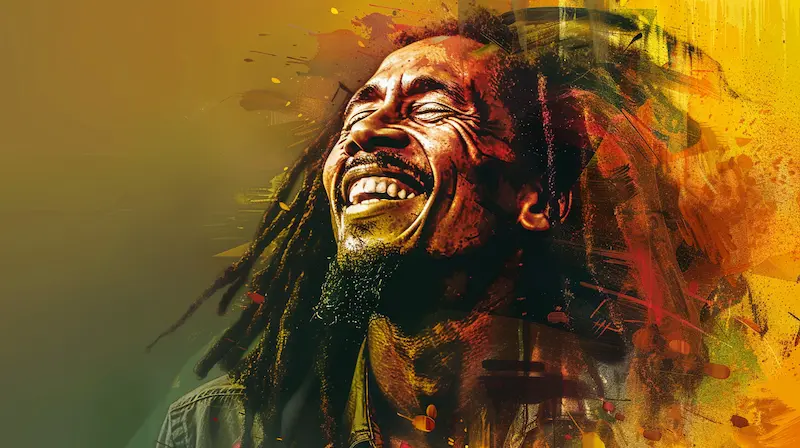
You can’t talk about reggae without mentioning Bob Marley — not because he was the most famous, but because he became its face, soul, and spirit. He transformed reggae from a local sound into a global force for change.
From the haunting chant of “Redemption Song” to the spiritual fire of “Exodus”, Marley sang not just for Jamaica, but for every oppressed soul around the world. He brought Rastafari, Africa, and Jamaican truth to international stages — barefoot, dreadlocked, and fearless.
“My music will go on forever,” Marley once said. He wasn’t wrong.
Peter Tosh: The Revolutionary
If Marley was the prophet, Peter Tosh was the warrior. He didn’t soften the message. He sharpened it.
His music was a sword, cutting through hypocrisy and oppression. Songs like “Equal Rights” and “Legalize It” weren’t just catchy — they were confrontational. He called out Babylon with unrelenting fire, and his activism often put him at odds with political leaders and even record labels.
Tosh’s legacy? Speaking truth to power — loudly and without apology.
Jimmy Cliff: The Gateway
Long before music videos and streaming platforms, one man put reggae in cinemas worldwide: Jimmy Cliff.
His breakout role in The Harder They Come (1972) introduced millions to both reggae and Jamaican life. The film’s soundtrack — with hits like “You Can Get It If You Really Want” — remains one of reggae’s greatest cultural exports.
Cliff’s voice was uplifting, hopeful, and soulful. He reminded the world that reggae could speak to hardship without losing its smile.
Burning Spear: The Spiritual Teacher
With a voice like thunder and lyrics like scripture, Burning Spear (Winston Rodney) became a cornerstone of roots reggae. His music is deeply tied to Rastafari, Marcus Garvey, and the spiritual return to Africa.
Albums like Marcus Garvey and Man in the Hills are meditative, powerful, and layered with historical insight. Listening to Burning Spear feels less like a concert — more like a sermon by firelight.
Gregory Isaacs: The Cool Ruler
Not all reggae is revolution — some of it is romance. And no one delivered love and heartbreak with more style than Gregory Isaacs.
Dubbed the “Cool Ruler,” Isaacs’ smooth vocals and lovers rock hits like “Night Nurse” and “Love Is Overdue” defined a whole subgenre. His laid-back flow showed reggae could be sultry, soulful, and seductive.
Lee “Scratch” Perry: The Alchemist
Where most saw a studio, Lee “Scratch” Perry saw a laboratory. The godfather of dub, Perry revolutionized music production with echo, reverb, and madness. He treated tracks like living things, manipulating space and sound until they breathed on their own.
Working with artists like Marley, The Congos, and Max Romeo, Perry proved that reggae wasn’t just a genre — it was a sonic universe waiting to be explored.
Modern Voices Carrying the Flame
The legacy lives on through today’s artists — each carrying reggae into the 21st century in their own way.
- Chronixx – Champion of the roots revival, blending old school with crisp modernity
- Protoje – Conscious and poetic, with tight flows and Afro-futurist vibes
- Koffee – Young, bold, and Grammy-winning — a new generation’s voice
- Alborosie – Sicilian-born but spiritually Jamaican, keeping dub alive
- SOJA, Rebelution, The Green – American reggae bands making waves globally
- J Boog – Bringing Pacific soul into reggae’s fold
- Lila Iké, Kabaka Pyramid, Jesse Royal – the new roots renaissance
What unites them isn’t where they come from — it’s what they believe in. That reggae is more than rhythm. It’s resistance. It’s reflection. It’s redemption.
🔗 Want to Learn More?
Check out our article on The Greatest Reggae Songs and Artists of All Time for deeper dives into iconic tracks and essential albums.
Fusion Genres and Reggae’s Influence in Modern Music
Reggae may have been born in the backstreets of Kingston, but it didn’t stay in a box. From its earliest days, reggae was a musical shapeshifter — borrowing, blending, and birthing entirely new genres. It’s the kind of sound that soaks into everything it touches. And over time, it has helped shape the soundtracks of clubs, car stereos, protests, and parties across the globe.
Some of the biggest music movements of the last 40 years owe a heavy debt to reggae — even if they wear different clothes.
Reggaeton: Reggae’s Latin Cousin
What happens when you take Jamaican dancehall riddims, mix them with Latin hip-hop, and throw in Caribbean Spanish lyrics?
You get reggaeton — one of the most commercially successful genres of the 21st century.
Artists like Daddy Yankee, Bad Bunny, and Karol G are household names, but the roots of reggaeton can be traced back to Jamaican immigrants in Panama and Puerto Rico, bringing dancehall and reggae with them.
The iconic “Dem Bow” rhythm, created by Jamaican producer Bobby Digital and popularized by Shabba Ranks, became the backbone of an entire Latin movement. And it’s still used in modern reggaeton hits today.
Reggae Rock and Punk Reggae
In the U.S., reggae fused with rock, punk, and alternative to create a new kind of rebel sound.
Think:
- Sublime – Surf-punk attitude with a reggae pulse
- 311 – Ska, rock, and roots wrapped in one
- The Police – British new wave with heavy reggae influence (“Walking on the Moon,” “Roxanne”)
- Slightly Stoopid, Dirty Heads, and Pepper – California beach vibes meets bass-heavy roots
Even punk bands like The Clash infused reggae into their DNA, collaborating with Jamaican artists and covering songs like Junior Murvin’s “Police & Thieves.”
This crossover wasn’t accidental — punk and reggae shared the same anti-authoritarian spirit. Just different accents.
Dubstep, Jungle, and EDM: Electronic Echoes
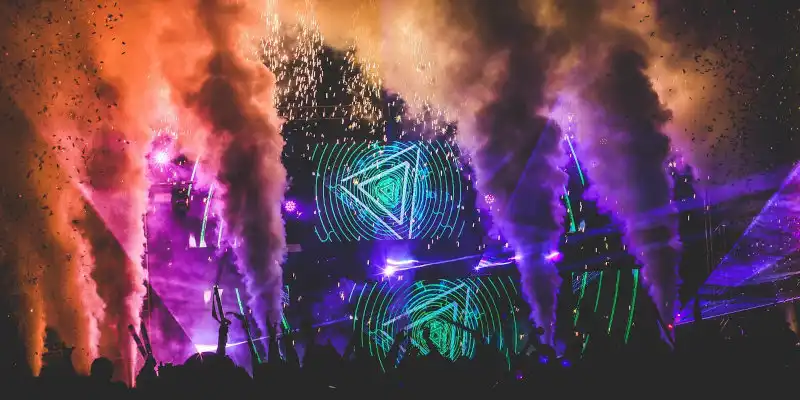
Reggae didn’t just influence live bands — it’s baked into the very architecture of electronic music.
- Dub, pioneered by Lee “Scratch” Perry and King Tubby, laid the foundation for today’s remix culture: stripped-back beats, heavy bass, echo, and reverb.
- From dub came UK jungle and drum & bass, borrowing reggae’s basslines and vocals.
- In the 2000s, producers like Skrillex, Rusko, and Bassnectar cited dub and dancehall as key influences on the birth of dubstep.
Even now, reggae rhythms creep into lo-fi, trap, and experimental pop — sometimes sampled, sometimes reimagined.
Lovers Rock: Reggae’s Romantic Side
Not all reggae was about revolution. Some of it was about love. Sweet, soulful, slow-dancing love.
Lovers rock, which blossomed in the UK in the 1970s, was reggae’s answer to soul and R&B — smoother melodies, softer vocals, and lyrics about heartbreak, longing, and passion.
Artists like:
- Janet Kay (“Silly Games”)
- Carroll Thompson
- Maxi Priest
…brought tenderness to a genre known for fire. And the sound found fans far beyond Britain, especially among Black women who didn’t always see themselves reflected in roots reggae’s masculine energy.
Afro-Reggae and Reggae Fusion
Reggae’s global influence led to new hybrid styles — often driven by local artists putting their own cultural stamp on the rhythm.
Examples include:
- Afro-reggae in Brazil and Nigeria, combining reggae with samba, Afrobeat, or Yoruba drums
- Reggae jazz, where improvisation meets one-drop grooves
- Hip-hop reggae, popularized by artists like Damian Marley, Nas, and KRS-One
Even artists like Lauryn Hill, Rihanna, Drake, and Beyoncé have incorporated reggae elements into chart-topping hits.
Reggae’s Influence Isn’t Fading — It’s Morphing
If you look at today’s music charts, you’ll find reggae’s fingerprints everywhere — in the rhythm of a pop hit, the cadence of a rap verse, or the sample behind a dancefloor anthem.
Because reggae isn’t a relic. It’s a living rhythm — and it keeps finding new voices, new forms, and new reasons to rise.
Reggae Today – A Worldwide Movement
More than 50 years since it first echoed out of Kingston, reggae is still rising. Its rhythm might evolve, its artists may change, but its heartbeat — that deep bassline of unity, resistance, and love — remains the same. Today, reggae isn’t just music. It’s a global movement, a spiritual refuge, and for many, a way of life.
Reggae as a Cultural Identity
Across continents and cultures, reggae has become a symbol. It represents something deeper than entertainment — a kind of moral compass wrapped in melody. Whether you’re hearing it at a music festival in Germany, a beach jam in the Philippines, or a bush doof in Australia, the vibe is unmistakable:
- Peace
- One Love
- Spiritual grounding
- A push for justice
And it’s not just being consumed — it’s being created. In nearly every region, artists are telling their stories through reggae’s timeless structure — using it to talk about what matters in their communities.
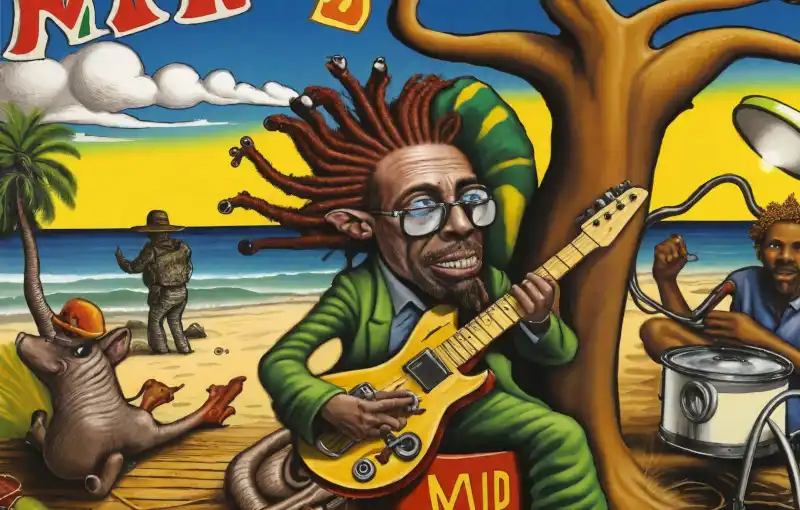
The Next Generation of Reggae Voices
Reggae is not stuck in the past — it’s full of young fire.
In Jamaica, the Reggae Revival movement led by artists like:
- Chronixx
- Protoje
- Lila Iké
- Kabaka Pyramid
- Jesse Royal
…has rekindled a roots-focused, conscious style that connects directly to Marley-era energy — but with modern polish and urgency.
Beyond Jamaica, new talent rises in every corner:
- Koffee – redefining what it means to be young, female, and Rasta in a male-dominated genre
- Blvk H3ro, Samory I, and Mortimer – weaving soul, roots, and futurism into their music
- In Africa, artists like Stonebwoy and Patoranking blend reggae with Afropop
These voices aren’t mimicking the past — they’re channeling the essence and evolving it for the times we live in now.
Reggae Media and Movements Today
With streaming platforms and social media, reggae has more reach than ever. Fans can:
- Discover deep dub playlists on Spotify
- Watch live sets from global reggae festivals on YouTube
- Tune into 24/7 reggae radio from Kingston to Tokyo
Movements like #RootsRevival, legalize ganja campaigns, and environmental justice projects often include reggae artists as spokespeople and soundtracks for their cause.
Even festivals like:
- Rototom Sunsplash (Spain)
- Rebel Salute (Jamaica)
- California Roots (USA)
- One Love Festival (UK)
…continue to bring together thousands who don’t just love reggae — they live it.
Reggae Is Not a Genre — It’s a Force
The beauty of reggae is that it never really tries to be trendy. It just tells the truth, steady and strong. And in a world that often moves too fast, that truth becomes an anchor — something to hold onto.
Reggae reminds us to slow down, to connect, and to feel.
Whether it’s a rebel anthem, a love song, or a dub instrumental that sinks into your bones, reggae meets you where you are — and lifts you to somewhere higher.
Final Thoughts
From Kingston’s ghettos to global stages, reggae has proven it’s more than music. It’s a movement of hearts and minds. And as long as there’s injustice to challenge, love to spread, and souls to stir, reggae will keep playing.
Because the world still needs that offbeat rhythm, that healing vibration, that one love.
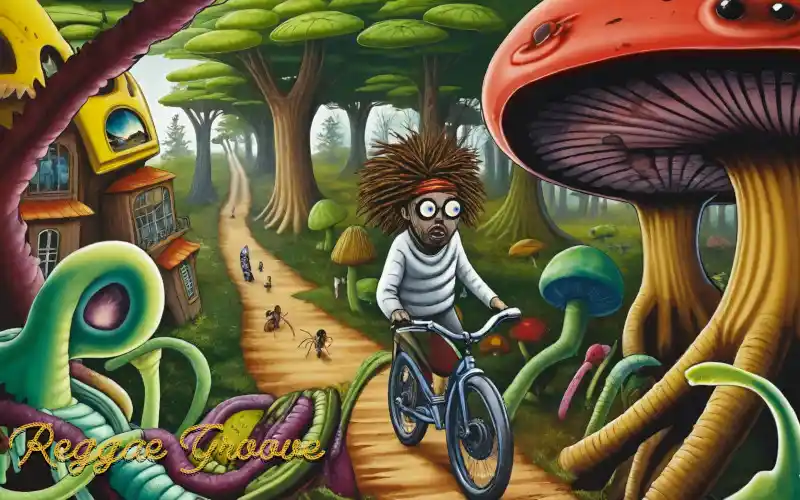
Conclusion: Reggae’s Global Legacy Lives On
Reggae may have started as the heartbeat of Jamaica, but today it’s a rhythm that echoes across the world. From the streets of Kingston to Tokyo’s dancehalls, London’s sound systems, and Nigeria’s freedom songs, reggae continues to inspire, unite, and uplift. It’s more than music — it’s a message.
As the world changes, reggae adapts — but it never loses its roots, its resistance, or its soul.
🔗 Keep the Vibes Going
Want to dive deeper into the sounds and stories that shaped reggae culture? Explore the Evolution of Reggae Music — from Ska to Dancehall
- Discover the Greatest Reggae Artists and Songs of All Time
- Chill out with our playlist-style post: The Best Reggae Songs to Relax and Vibe To
Reggae Music Can Change the World
Welcome to the Reggae Groove blog — your source for roots music, reggae culture, conscious living, and artist insights. Discover new playlists, interviews, and the history behind the “riddims”.
Our 50 Top Reggae Songs of All Time
Reggae Music’s All Time Top 50 The 50 top Reggae songs have made a lasting impression on the world of music. Their rich lyrics and distinctive rhythm have captivated a worldwide fanbase. The genre, which originated in Jamaica, has expanded and influenced the development of many other musical genres. The genre’s enduring appeal is demonstrated…
The Evolution of Reggae Genres: Ska, Rocksteady, Roots, Dub & Dancehall
The Evolution of Reggae Styles To properly explain reggae genres, you must understand that Reggae music is more than a sound—it’s a cultural movement that tells the story of Jamaica’s social struggles, spiritual awakenings, and vibrant rhythms. What began as local street music in Kingston grew into one of the world’s most influential music genres….
The World’s Best Reggae Festivals
The World’s Greatest Reggae Festivals: A Reference Book for Music Enthusiasts Reggae is a movement as much as a genre of music. It’s a sound that conveys resistance, love, and solidarity. By attending the best reggae festivals you experience the power and emotion that can be generated when people are brought together by love. Whether…
The Echo Chamber: The History of Dub Music
Introduction: What Is Dub Music? To understand the global soundscape of modern music — from remix culture to electronic beats — you have to start in a small Kingston studio in the late 1960s. This is where Dub music was born. But what is Dub music exactly? Dub is more than a subgenre of reggae….
Reggae Love Songs: Timeless Songs of Romance, Roots, and Rhythm
Reggae Love Songs: The Timeless Sound of Romance Music has always been a space for discovering love, and reggae is no exception. However, reggae love songs differ from the polished ballads that often top pop charts. They carry a heartbeat shaped by Jamaica’s struggles, spirituality, and a longing for connection that goes beyond the individual….
Reggae Instruments: The Sound Behind the Music
Introduction: Reggae Instruments Make the Sound From the laid-back riddims of Bob Marley to the deep dub grooves of King Tubby, reggae has a signature sound that is instantly recognizable. But what gives reggae music its infectious pulse and irie vibe? The answer lies in its distinct array of reggae instruments—each playing a unique role…
Reggae Dance Styles Explained: How to Groove to Every Beat
Introduction: Feel the Rhythm, Move Your Soul When you hear a reggae beat, something stirs in your body before your brain even catches up. It’s that offbeat rhythm, the deep pulse of the bass, the ancestral echo that says: move. Reggae dance styles are more than steps — they’re an invitation to feel, connect, and…
Reggae Artists Guide: Legends, New Artists, & Pioneers
/ Reggae Artists Any reggae artists guide has to start with Ska and Rocksteady. These were the original Jamaican sounds that paved the path for reggae in the late 1960s. Influential individuals like Bob Marley helped the genre become well-known by using it as a platform for social reform and unity. Its themes of resistance,…
The 10 Most Iconic Reggae Music Videos & Their Stories
Introduction – Iconic Reggae Videos Music videos have always been more than just visuals for songs. At their best, they are short films that create a mood, capture a cultural moment, or tell a story that words and music can’t fully convey. For reggae, a genre steeped in rhythm, resistance, and cultural heritage, music videos…
Rastafarianism and Reggae: The Revolutionary Heart of a World Movement
Introduction: Reggae and Rastafariamism More than just a genre, reggae music serves as a medium for spiritual resistance, identification, and worldwide emancipation. Rooted in the struggle of post-colonial Jamaica and intertwined with the philosophy of Rastafarianism, reggae has transcended borders to become a unifying voice for oppressed peoples across the world. This comprehensive article explores…
Mad Collective Connection Live at Nimbin MardiGrass
A Raw Glimpse of MCC Live at Nimbin MardiGrass Mad Collective Connection Live at Nimbin MardiGrass shows reggae is about truth, unity, and real vibes—not perfection. That’s why MCC are showing this raw, unfiltered moment from their performance at the MardiGrass Festival in Nimbin’s Main Hall. It’s not polished, it’s not glamorized – it’s real….
Reggae Quotes That Will Lift Your Soul
The Best Reggae Quotes “One good thing about music, when it hits you, you feel no pain.” – Bob Marley quote. Reggae quotes touch our hearts and lift our spirits. Reggae music, rooted in Jamaican culture, inspires and motivates us. Artists like Bob Marley have given us uplifting messages that reach people worldwide. In this…
The Function of Bass in Reggae Music
The Function of Bass and Rhythm in Roots Music: The Burning Heartbeat of Reggae Mad Collective Connection’s distinct musical pulse connects with our listeners on an emotional level. Unlike many other genres, bass in reggae music has a fundamental role, combining with drums to create a distinctive groove. In addition to the beat’s distinctive timing,…
Rocksteady Music: Jamaica’s Short-Lived Sound That Shaped Reggae Forever
Rocksteady Music: The Jamaican Sound That Gave Rise to Reggae When we think of Jamaican music, reggae usually takes center stage, but before reggae became a global force, another sound ruled Kingston’s dancehalls for a brief yet crucial period: rocksteady music. Born in the mid-1960s, rocksteady may have lasted only a couple of years before…
Mento: The Jamaican Folk Music That Sparked a Musical Revolution
Mento: Jamaican Folk Music Evolves When people think of Jamaican music, reggae and Bob Marley usually spring to mind. But long before reggae’s offbeat rhythm swayed the world, another style was already making Jamaica dance — Mento. This homegrown folk music, born in the hills and villages of rural Jamaica, set the stage for ska,…
The Wailers: From Trenchtown Harmony to Global Icons
The Formative Years: Humble Beginnings in Trenchtown Every story in reggae history seems to trace back to Trenchtown, and The Wailers were no exception. It wasn’t the kind of neighborhood that encouraged dreams of global fame. Sheet-metal houses leaned together, poverty pressed in from all sides, and daily survival often took priority over art. Yet…
What is Reggae? – A Reggae Music Guide
Our reggae music guide starts with its inception in Jamaica before discussing how it captured the world. Reggae music is known for its special rhythm and focus on fairness, but its definition requires more more than understanding the music, you have to understand the movement. What is Reggae For newcomers, diving into reggae music is…
Lovers Rock: The Sweet Sound of Reggae’s Romantic Heart
Lovers Rock: The Romantic Sound of Reggae and Its Lasting Legacy When people think of reggae, the mind often goes to Bob Marley, protest songs, or deep basslines carrying messages of survival. But within reggae’s vast landscape lies a softer corner—one where the music sways rather than marches, and where the lyrics whisper about matters…
The Impact of Reggae Music
The Impact of Reggae on Contemporary Music: From EDM to Hip-Hop The impact of reggae music is extensive. Far more than just a music genre, it is the rhythm of defiance, and the starting point for innumerable subsequent styles. Reggae, which originated on the streets of Kingston, Jamaica, has spread its messages of love, solidarity,…
Reggae Fusion: From Dancehall to Mainstream
A Brief History of Reggae Fusion While it may feel like a modern phenomenon, reggae fusion has been in the works since at least the 1980s. Back then, Jamaican dancehall artists were experimenting with digital production, moving away from the purely organic sound of roots reggae. The beats were faster, the lyrics often more playful…
Ska Jazz: Where Jamaican Rhythm Meets American Sophistication
Introduction – Jazz Meets the Offbeat Ska jazz was, in many ways, was almost an inevitable subgenre, as it represents a blend of the lively rhythms of Jamaican ska and the improvisational sophistication of American jazz. Starting in the late 1950s, ska jazz combined the energetic offbeat rhythms characteristic of Jamaica with the horn-centric tunes,…
Ska to Punk: How Reggae Fashion Was Redefined by the UK’s Two-Tone Movement
Two-Tone Fashion: Ska to Punk Style & Reggae Influence Reggae’s rich cultural identity is just one of its many facets. Cultural identity is particularly noticeable in reggae fashion. While Jamaica gave birth to the foundational rhythms and Rastafarian-inspired attire, the late 1970s in the United Kingdom saw a revolutionary fusion of sounds and styles that…
Reggae Music Healing Powers
The Power of Reggae Vibes Reggae music healing is a force of nature that soothes the soul and lifts the spirit. Reggae has always conveyed messages of love, peace, and resiliency, because of its strong origins in Jamaica and global appeal. Whether you’re going through a tough time or just need to unwind, the steady…
The Ultimate Reggae Fan’s Guide to Jamaican Patois
Introduction: Why a Jamaican Patois Translator Matters I am the quintessential white Jock (Literally as I was born in Scotland) and found myself playing in a reggae band with a group of Jamaican and African friends. The guys were polite and always spoke to me in clear English, but when they spoke to each other…
The True Hip-Hop Origins: How Jamaican Sound Systems Built a Genre
Introduction: Hip-Hop More Than a Bronx Story When you ask people where hip-hop started, most will say the Bronx in the 1970s, and, although this is correct, it doesn’t provide the complete picture. The origins link back to Kingston, Jamaica, across the Caribbean Sea. Hip-hop is a cultural exchange between these two places: one known…
King Tubby: The Architect of Dub and Sound System Innovation
Introduction: The Sound Scientist of Dromilly Avenue In the bustling streets of Waterhouse, Kingston, where zinc fences vibrated with each bassline and evenings buzzed with sound clashes, a quiet man was reshaping music. Osbourne Ruddock, better known as King Tubby, was not the usual reggae icon. He wasn’t a flashy singer or a bold deejay….
Jamaican Sound Systems: How Jamaican Toasting & DJ Culture Conquered the World
Introduction: The Rise of Reggae Sound Systems Before reggae conquered the world stage, its powerful rhythms boomed from hand-built speakers on the vibrant streets of Kingston, Jamaica. The reggae sound systems, which were large, movable sets that brought music, messages, and movement straight to the people, were at the center of this vibrant street culture….
Bob Marley’s Reggae Influence: How His Music Became a Global Anthem for Justice
Summary: How Bob Marley’s Music Inspired the World Bob Marley’s influence on music spans genres from rock and hip-hop to pop, primarily due to five revolutionary factors: Continue reading for a deep dive into each factor… Introduction – Bob Marley’s Music Few artists have shaped both a musical style and a view on life. Reggae…
The Roots of Reggae Music
The Origins of Reggae Music To understand the spiritual connection in reggae music, it is essential to explore the roots of reggae music. Reggae emerged from earlier Jamaican music styles such as ska and Rocksteady. Steady, offbeat rhythms developed over time, with lyrics predominantly demanding social awareness. However, Rastafari moulded reggae into a distinct genre…
Best Reggae Artists Of All Time
Best Reggae Artists You Should Know (Classic & Modern) Reggae music has greatly influenced popular music for decades. It began in Jamaica and has reached fans globally. Reggae artists blend unique rhythms with meaningful messages. Over time, reggae has branched out into many styles. From its early days to today’s reggae music artists, it continues…
Reggae Fashion & Style: From Rasta Colors to Modern Streetwear
Introduction – Reggae as a Cultural Identity Reggae is a mood, a lifestyle, and let’s be honest, a fashion statement that you can spot a mile away. One look at those vibrant Rasta colors—red, gold, green, and sometimes black—and you instantly feel the irie vibes. But reggae fashion goes way beyond a knitted tam hat or…
Iconic Reggae Album Art: A Journey Through Visual Storytelling
Introduction: Iconic Reggae Album Artwork Walk into any record shop with a decent reggae section and you’ll notice something immediately: the covers have a certain pull. Perhaps it’s the striking red, gold, and green; perhaps it’s a blurry picture of a vocalist with dreadlocks looking straight at you; perhaps it’s the bizarre, hand-drawn collage that…
6 Modern Reggae Artists Keeping the Tradition Alive
Introduction – Reggae as a Cultural Identity More than just a musical style, reggae has always stood for a cultural movement, a philosophy, and a soundtrack for both solidarity and resistance. Starting in Jamaica during the late 1960s, reggae amplified the voices of the marginalized, provided a rhythm for protest, and shared the spiritual teachings…
Peter Tosh: The Stepping Razor – A Profile in Reggae Rebellion
Introduction Peter Tosh, known as The Stepping Razor of reggae, wasn’t just another star. He was an uncompromising rebel. While Bob Marley carried the flag of unity, Tosh wielded the sword of justice. A roots reggae pioneer, activist, and passionate lyricist, he turned songs like Legalize It and Equal Rights into protest anthems that still…
Grammy for Best Reggae Album: Reggae’s Most Prestigious Award
Introduction: Reggae’s Golden Moment Reggae is more than just a genre, it’s a movement, a heartbeat, and a universal language of resistance and rhythm. And when reggae’s finest gather each year for the Grammy Awards, the world tunes in to see which album will be crowned Best Reggae Album. From the first Grammy for Best…
The History of Reggae Music: A Timeline of Its Evolution from Mento to Dancehall
Reggae History: Mento to Dancehall & Beyond This timeline of reggae music showcases the genre’s remarkable evolution. Reggae is more than a music genre—it’s the sound of Jamaica’s soul. It tells stories of freedom, struggle, and cultural pride. But reggae didn’t just appear overnight. It evolved through decades of rhythmic revolutions—from mento’s rural folk beats…
New Age Reggae Culture Revival – Bigger Than the 70’s
The Reasons Behind the Global Resurgence of Reggae Culture A reggae cultural revival is taking the world by storm. From Kingston’s streets to Australia’s beaches and the South African townships, the rhythm is catching fire. But this isn’t just a nostalgic throwback. This is a cultural revival. A new generation is tuning into reggae—not just…
Lee “Scratch” Perry: The Upsetter’s Wild Genius
Introduction: The Mad Scientist of Reggae Lee “Scratch” Perry was a tough person to define. Depending on who you asked, he was a madman, a prophet, or a musical genius. Sometimes he embodied all three in a single day. Perry undoubtedly altered the direction of current music, dub, and reggae. While Bob Marley’s voice introduced…
A Religion of Reggae and Spirituality
Reggae and Rastafari: A Religion of Spiritualism and Reggae Music Reggae and spirituality are closely intertwined with the Rastafari faith. Reggae songs provide a strong medium for the spread of resistance, love, and spiritual enlightenment. From the anthems of Bob Marley to the mystical echoes in lesser-known tracks, the connection between reggae and Rastafari is undeniable. This…
Bob Marley and His Profound Influence on Reggae
Introduction: The Man Who Made Reggae a Global Language Few names in music history carry the weight and universal resonance of Bob Marley. When people ask, “What was Bob Marley known for?” or “Why was Bob Marley important?”—The response reverberates through decades of sound, hope, and transformation. Marley was more than a singer. He was…
